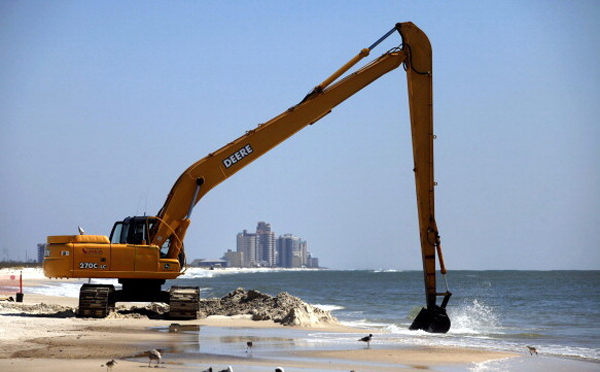- South Texas Students Meet Accordion Music Icons Los Tigres Del Norte In Edinburg Thanks To Khs America/Hohner Alianza Académica Initiative
- Fragile Planet Offers a Nighttime Wildlife Experience
- Falcons Soccer Off & Running
- Cameron County Receives Funds to Improve Two Parks
- Falcons Complete First Half of 32-6A
- School District to Help out Victims of California Wildfires
- Sand Castle Days Continued Despite Unexpected Weather
- Ready for District
- Discussion of Garbage Dumpster Rates, Agreements Between State & City on Highway Regulations, and More
- 31st Annual Shrimp Cook-Off is Right Around the Corner
Oil-Spill Fines to Create 300 Conservation Jobs in Gulf Coast States
- Updated: August 18, 2017

The GulfCorps project plans to hire 300 new conservation workers to help restore portions of the Gulf Coast damaged by the 2010 BP oil spill. Photo: Thayer/GettyImages
by Mark Richardson
GALVESTON, Texas — Conservation groups announced that 300 new conservation jobs will be created in Texas and other Gulf Coast states with restoration funds from the Deepwater Horizon oil spill in 2010.
The $7 million project, funded by fines from the incident, will repair and restore coastal areas damaged by the oil spill in Texas, Louisiana, Alabama, Mississippi and Florida. Mary Ellen Sprenkel, executive director at Corps Network, a group that organizes young adults to do conservation work, said the jobs will go to people from the towns where the work needs to be done.
“We will be working with our existing programs in the Gulf states to train young people in their communities to do this restoration work – to provide young people with training, to do the ecological work and provide them with career opportunities,” Sprenkel said.
The partnership, called GulfCorps, includes The National Oceanic and Atmospheric Administration, The Nature Conservancy, The Corps Network and the Student Conservation Association. Grant funds from the RESTORE Act will be used to plant native vegetation, remove invasive species and restore stream banks and shorelines.
In 2010, a BP oil platform exploded 25 miles off the coast of Louisiana and dumped almost 5 million barrels of crude oil into the Gulf before it was capped. Sprenkel said it’s important that people from the hardest hit areas will be hired for the GulfCorps projects.
“I think that it’s an opportunity to maybe bring something positive out of the oil spill in terms of engaging and providing opportunity to young people in some very economically depressed communities,” she said.
Sprenkel said the project will have similar goals and objectives to the Civilian Conservation Corps, President Franklin D. Roosevelt’s Great Depression undertaking in the 1930s. She said there’s still a great deal of work to be done in coastal areas since the spill.
“This is definitely cleaning up the original problem. A lot of the oil is gone but this is ecological problems that were caused as a direct result and absolutely need to be addressed,” Sprenkel said. “It speaks to the fact that the recovery dollars have been so slow in hitting the ground.”
GulfCorps officials say they will begin hiring for the positions this fall.
